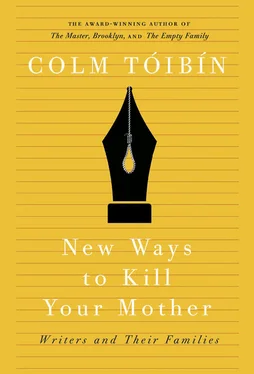When the book was published, Cheever was on the cover of Newsweek with the caption: ‘A Great American Novel’. The book was number one on the New York Times best-seller list for three weeks. In 1979 Cheever’s collected Stories won a Pulitzer Prize and wide critical acclaim.
Falconer arose from the clash between the two most significant buildings in the town of Ossining: Cheever’s suburban home, which was for him and his family often like a prison, and Sing Sing. In the early 1970s, when he had exhausted himself by drinking and had also exhausted himself writing slack stories on the subject of the deep despair and the minor travails inherent in American East Coast suburban life, Cheever was invited to teach at Sing Sing, where he befriended one of the prisoners. He saw a great deal of this man when he was released. ‘Almost every set piece in Falconer ,’ Bailey writes, ‘almost every detail… appears somewhere in Cheever’s journal entries about Sing Sing, based on information he’d extracted from inmates.’ The novel, which is short, has a relentlessness in tone, a gravity and seriousness, which is unlike anything else Cheever wrote. It is as though the book were not merely a strained metaphor for all the anguish Cheever felt and caused in his life, but an exploration and recognition of that anguish, presented in a style that was factual but also heightened and controlled and then filled with suffering. The style is risky in the way it allows bald statement to brush against an overall vision that is like something from the Psalms. The sense of violence, hatred, pain and deep alienation is offered raw; beside this, love, or something like love, comes as dark redemption or another form of power. In the middle somewhere are the grim ordinariness of prison life and some brilliant sex scenes. If you ignore the upbeat, cheesy ending, Falconer is the best Russian novel in the English language.
Cheever’s journals for the months when he worked on his masterpiece are fascinating. He understood that even the smallest experience, such as a wait at an airport, can become something much larger in the imagination. ‘On the question of crypto-autobiography,’ he wrote,
and the fact that the greatness of fiction is not this, I am writing not from my experience as a teacher in prison but from my experience as a man. I have seen confinement in prison, but I have experienced confinement as a corporal in a line rifle company, as a stockade guard, as a traveller confined for 36 hours in the Leningrad airport during a blizzard, and for as long again in the Cairo airport during a strike. I have known emotional, sexual and financial confinements, and I have actually been confined to a dryout tank on 93rd Street for clinical alcoholics.
In the next entry, he ends with a remark that is one of the few endearing remarks in his journals and should be the motto of every writer alive: ‘All right, I want something beautiful, and it will be done by June.’
Cheever enjoyed being famous and dry for the last few years of his life. Since there was something petulant and childish about him when he was a drunk, now merely the child remained. Susan wrote about these years, as he basked in late success.
Wealth and fame and love had an odd effect on my father… He went through a kind of adolescence of celebrity. At times he seemed to be his own number one groupie… In restaurants, he let head waiters know that he was someone important. Since this kind of behaviour was new to him, he wasn’t particularly graceful about it.
Federico, whose remarks on his father are notable for their wisdom and general good humour, has the best line on his father’s fame: ‘When you’re a musician, people can ask you to play, and when you’re a movie star, people can ask for your autograph, but what does it mean to be a famous writer? Well, you get to say pompous things. You get to talk about aesthetics and things like that. That’s the goodies you get.’
As he made an effort to repair the damage he had done to his family, Cheever was aware that his journals, 4,000 pages of them, lay in a drawer like a lovely toy time bomb. Two weeks before he died he phoned his son Ben: ‘What I wanted to tell you,’ he said, ‘is that your father has had his cock sucked by quite a few disreputable characters. I thought I’d tell you that, because sooner or later somebody’s going to tell you and I’d just as soon it came from me.’ Ben wrote that he was ‘forgiving’. ‘But mostly I was just bewildered, and I remember now that my reply came almost as a whisper: “I don’t mind, Daddy, if you don’t mind.”’ After his death, when Susan read the diaries, needing to flesh things out for her memoir, she was pretty surprised by the general tone and content, and ‘not only’, as Bailey writes, ‘because of the gloomy, relentless sexual stuff’. The New Yorker and Knopf paid $1.2 million for the rights to publish the diaries and they appeared in 1991. Mary Cheever, who had stayed with him until the end, did not read them. ‘I didn’t have any strong feelings about whether they were published or not. I can’t read them. Snatches of them I’ve read, but I can’t sit down and read that stuff. It isn’t my life at all. It’s him, it’s all him. It’s all inside him.’
Baldwin and ‘the American Confusion’
In December 1962 The New York Times asked some of the year’s best-selling authors to write a piece describing ‘what they believe there is about their book or the climate of the times that has made [their book] so popular’. In reply, Vance Packard, for example, explained that his book The Pyramid Climbers had been successful because, he believed, ‘there is a growing uneasiness among Americans about the terms of their existence, and many tell me that I often articulate their own apprehensions’. Patrick Dennis, author of Genius , wrote: ‘I can’t imagine what it is that makes my books sell and any author who claims to know is a fool or a liar or both.’ This did not deter Allen Drury, whose book A Shade of Difference was on the list. ‘I hope,’ he wrote, ‘those readers who like what I have to say like it because it is honest, well-expressed and pertinent to the world in which we live.’
James Baldwin’s Another Country had also been a best-seller, and Baldwin used the occasion to position himself ambiguously in two of the central pantheons of American beauty. ‘I don’t mean to compare myself to a couple of artists I unreservedly admire,’ he wrote,
Miles Davis and Ray Charles — but I would like to think that some of the people who liked my book responded to it in a way similar to the way they respond when Miles and Ray are blowing. These artists, in their very different ways, sing a kind of universal blues… They are telling us something of what it is like to be alive. It is not self-pity which one hears in them but compassion… I think I really helplessly model myself on jazz musicians and try to write the way they sound… I am aiming at what Henry James called ‘perception at the pitch of passion’.
Baldwin was claiming for his prose style and the structure of his novels something of the heightened, melancholy beauty of Davis and Charles; he was suggesting that the rhythms of his own diction took their bearings from the solitary pain, the uncompromising glamour that these two American musicians offered the world. But just in case anyone reading him wanted thus to place him as a primitive, a writer who did not plan his work but merely let it soar, a writer not steeped in a writerly tradition, Baldwin needed to invoke as well the high priest of American refinement, an author known not for his passion, however pitched, but for the rigour of his controlling imagination.
Читать дальше












